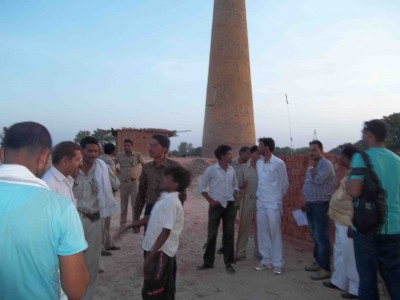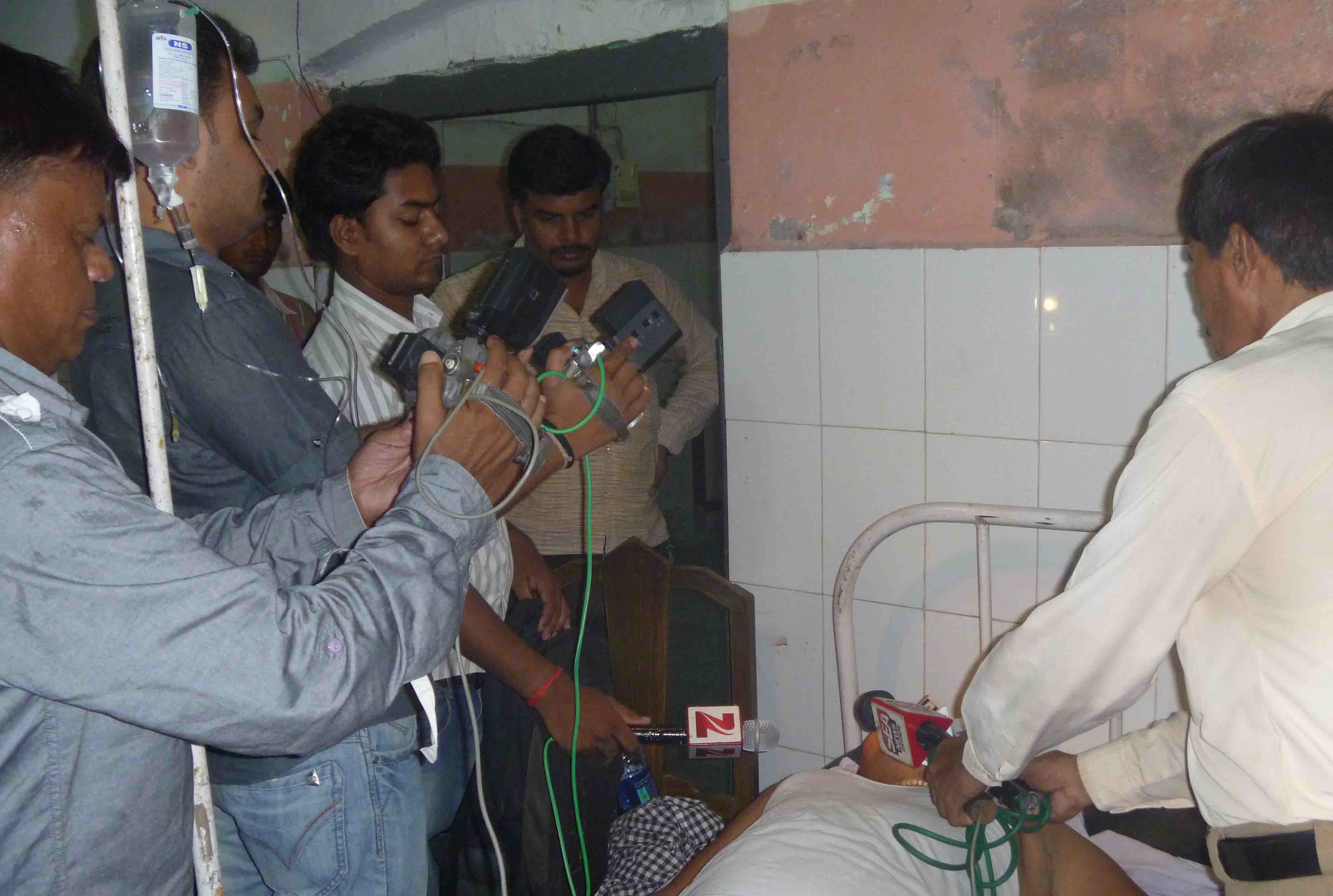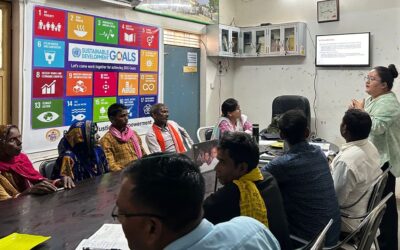Editors Note: this article was written by FTS South Asia Director Supriya Awasthi and FTS Associate Programs Director Ginny Baumann.
Free the Slaves has received deeply disturbing news from our frontline partner organization, Manav Sansadhan Evam Mahila Vikas Sansthan (MSEMVS), about a vicious assault on the group’s staffers, government officials and several slavery survivors.
They were ambushed late Wednesday while traveling to a local police station to give testimony after a rescue at a brick kiln in the Bhadohi District in the Indian state of Uttar Pradesh.
Santosh Pandey, a coordinator of one of MSEMVS’ anti-slavery projects, was beaten unconscious with bricks, bottles and sticks. He is now hospitalized in serious condition. Two rescued slaves were also beaten, along with three other MSEMVS staffers, one government official and two police officers, although none of these required medical treatment. One woman and child disappeared from the site of the ambush. Eight survivors are now in a safe location, recovering from the incident.
A Routine Raid
MSEMVS had demanded that authorities carry out the raid after hearing allegations that workers were in bonded labor slavery at the Adarsh Marka brick kiln. During the raid, victims provided initial information about their situation. Two female victims gave information about physical and sexual abuse at the kiln.

Early in the rescue, events were unfolding as planned. | Photo: MSEMVS
Authorities had arrested one son of the brick kiln’s owner during the raid, but had not arrested the kiln owner, his other two sons or the managers of the site, who absconded while police were taking information from victims, according to MSEMVS.
As evening began and it was becoming dark, officials decided to move the victims to a police station so they could complete formal statements.
District officials, police, MSEMVS staff and victims left the site in three vehicles. The slavery survivors, Santosh and other MSEMVS staff and volunteers were in the third vehicle.
A Roadside Ambush
Shortly after leaving the brick kiln site, they found the road blocked by two tractors. The smaller official vehicles were able to pass around the tractors, but the third vehicle moved off the road to find a way through. The rescued slaves and MSEMVS staff got down from the vehicle as it tried to move around the roadblock.
That is when the brick kiln owner, his son and a large group of men appeared. They attacked Santosh and the slavery survivors, according to MSEMVS. The government vehicles stopped, and some of the police officers came back to help, but were also beaten. There were not enough police to quell the violence. The brick kiln owner’s men took a gun from one of the police officers. The kiln owner’s son pulled the leading government official on the raid out of his vehicle and beat him, according to MSEMVS. Police officers left the scene as the attack continued.
Police reinforcements were called. When they arrived, they arrested the kiln owner’s son and some of the other assailants. The owner got away. The arrested men have been charged with attempted murder, rape, beating a government official and other criminal offenses, according to MSEMVS. Police have issued a warrant for the arrest of the owner.
The Current Situation

Santosh interviewed by reporters in hospital. | Photo: MSEMVS
Police are now searching for the two missing slavery survivors. Meanwhile, surrounding brick kilns are deserted and officials are demanding that owners of these kilns explain where their workers are now. It is suspected that the owners are hiding dozens of laborers, who might otherwise come forward to provide similar testimony to authorities about bonded labor slavery.
The lead government official on the raid has said that the head of the local police station should be suspended because his behavior has raised suspicion.
Santosh is suffering injuries to his head, back, arms and legs, but he is now conscious and has spoken to Indian journalists from his hospital bed.
“Our thoughts are with Santosh and others who were injured in this brutal attack,” says FTS Executive Director Maurice Middleberg. “We hope that the missing victims are quickly found and moved to a secure location, and that the perpetrators of this assault are brought to justice.”
The director of MSEMVS, Bhanuja Sharan Lal, says the incident will not deter his group’s work. “Our weapon against exploitation and slavery is the law and Constitution,” he said. “We may get disappointed with such unfortunate incidents, but this makes our team more committed to fight against slavery.”
Systemic Change Needed
Although Indian officials are now focused on protecting the survivors and investigating the attack, the incident highlights extreme systemic failures by authorities in Uttar Pradesh to give meaningful protection to its citizens from conditions of modern slavery:
- In October 2012, the Indian Supreme Court again ordered the states to take systematic actions against forms of bonded labor under their jurisdiction. In particular they were required to carry out surveys of bonded labor slavery in order to find, release and rehabilitate bonded labor slaves. The state of Uttar Pradesh has not carried out such surveys since the court order.
- As in this case, it is consistently left to human rights groups and local community groups to try to get the authorities to rescue victims of bonded labor slavery.
- As in this case, police are typically under-prepared and under-resourced to safely rescue victims, as well as arrest perpetrators during such raids. (Only six police officers were present for this raid.) Despite human rights groups’ efforts and appeals to higher authorities, charges are rarely filed against slaveholders and in Uttar Pradesh there have been no convictions as a result of legal proceedings against brick kiln owners and other managers of slavery sites.
This incident highlights the urgent need for:
- The national government to take decisive action to ensure that each state fulfills its responsibilities for eradication of bonded labor. State governments must be made accountable for their performance against this form of modern slavery.
- The state of Uttar Pradesh to appoint a responsible official with effective powers and resources to mobilize district and local officials against bonded labor slavery. Official vigilance committees at district and tehsil level should be made to function.
- The state to immediately launch the mandated survey of bonded labor slavery, especially targeting sites such as brick kilns, where bonded labor is the norm rather than the exception. All functioning brick kilns in the state should be rapidly registered and inspected, with recognized participation by committed human rights organizations.
- Release and rehabilitation of bonded laborers to be put on immediate priority, emphasizing physical protection, rapid compensation and access to essential entitlements of the victims.
- Impunity of slaveholding business owners to be ended. Prosecution under the Bonded Labor Act should be accelerated, resulting in convictions and sentencing of perpetrators.



